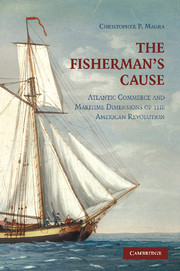Book contents
- Frontmatter
- Contents
- Acknowledgments
- Abbreviations
- Introduction
- Part One THE RISE OF THE COLONIAL COD FISHERIES
- Part Two ATLANTIC ORIGINS OF THE AMERICAN REVOLUTIONARY WAR
- 4 Cod and the Atlantic Economy
- 5 Atlantic Business Competition and the Political Economy of Cod: Part One
- 6 Atlantic Business Competition and the Political Economy of Cod: Part Two
- 7 The New England Trade and Fisheries Act
- Part Three THE MILITARY MOBILIZATION OF THE FISHING INDUSTRY
- Index
- References
6 - Atlantic Business Competition and the Political Economy of Cod: Part Two
Published online by Cambridge University Press: 03 July 2009
- Frontmatter
- Contents
- Acknowledgments
- Abbreviations
- Introduction
- Part One THE RISE OF THE COLONIAL COD FISHERIES
- Part Two ATLANTIC ORIGINS OF THE AMERICAN REVOLUTIONARY WAR
- 4 Cod and the Atlantic Economy
- 5 Atlantic Business Competition and the Political Economy of Cod: Part One
- 6 Atlantic Business Competition and the Political Economy of Cod: Part Two
- 7 The New England Trade and Fisheries Act
- Part Three THE MILITARY MOBILIZATION OF THE FISHING INDUSTRY
- Index
- References
Summary
I now Enclose you four Depositions relative to the interruption our Fishery has met with on the coast of Labrador.
Skipper Jonathan Millet and Company of the schooner Hawke were “a-Fishing in the Straits of Belle Isle near Bradore [Labrador]” on a summer fare in July 1766 when Captain Hamilton, “the Master of his Majesties' Sloop Merlin with a Number of Armed Men in several Boats came on board my Schooner, and demanded my Business there.” The surprised yet pugnacious Yankee skipper “told him I was on a cod fishing Voyage from New England.” The British naval officer treated Millet “as an Enemy … He damned me and gave a Blow with his Fist on my Face. I told him it was hard Usage. He again damned me & then ordered a Number of armed Men to seize me which they did. One of them at the same time shoving a Loaded Pistol against my Breast.” Captain Hamilton informed the colonial fishing crew they “were a Pack of Damned Rascals several times.” According to Millet, “He then seized my Vessel & Fish and put a Sentry on board.” The captain of the HMS Merlin “kept [i.e. pressed] one of my Men, viz. Francis Con, & threatened that if he ever Catched any New England Men Fishing there again that he would seize their Vessels & Fish and keep all the Men, beside inflicting severe Corporal Punishment on every man he took.”
- Type
- Chapter
- Information
- The Fisherman's CauseAtlantic Commerce and Maritime Dimensions of the American Revolution, pp. 127 - 141Publisher: Cambridge University PressPrint publication year: 2009



